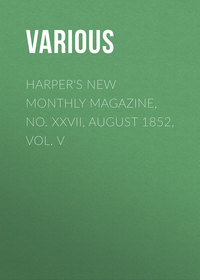Sadece Litres'te okuyun
Kitap dosya olarak indirilemez ancak uygulamamız üzerinden veya online olarak web sitemizden okunabilir.
Kitabı oku: «Harper's New Monthly Magazine, No. XXVII, August 1852, Vol. V», sayfa 15
Various
Bir şeyler ters gitti, lütfen daha sonra tekrar deneyin
2,0
1 puan
Türler ve etiketler
Yaş sınırı:
12+Litres'teki yayın tarihi:
13 ekim 2017Hacim:
490 s. 1 illüstrasyonTelif hakkı:
Public Domain